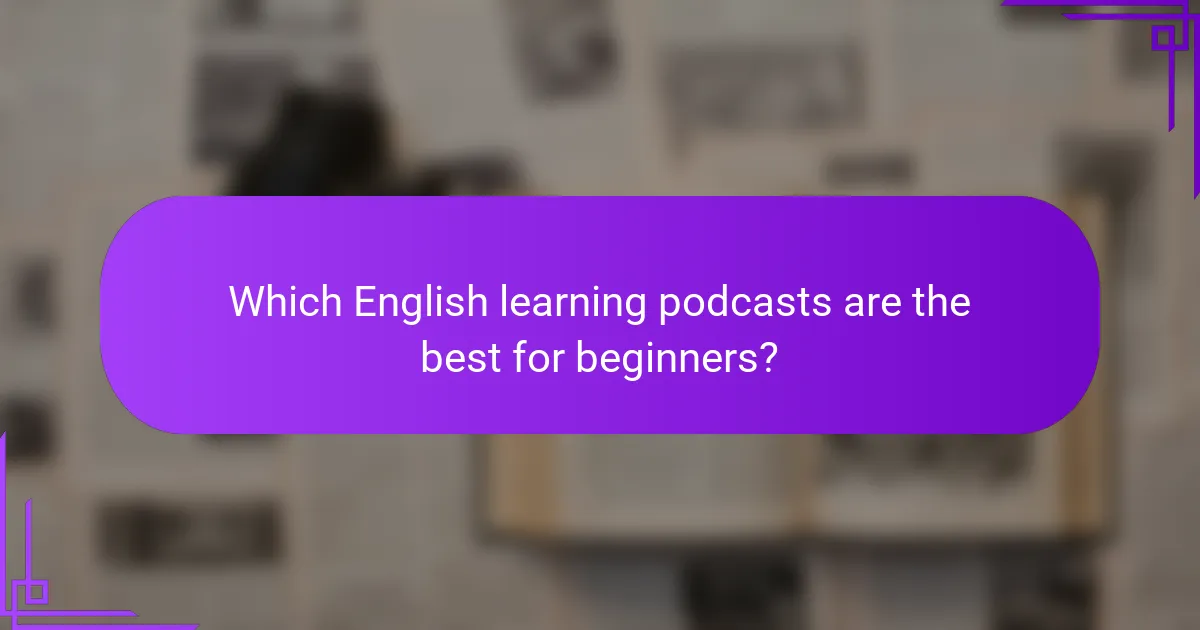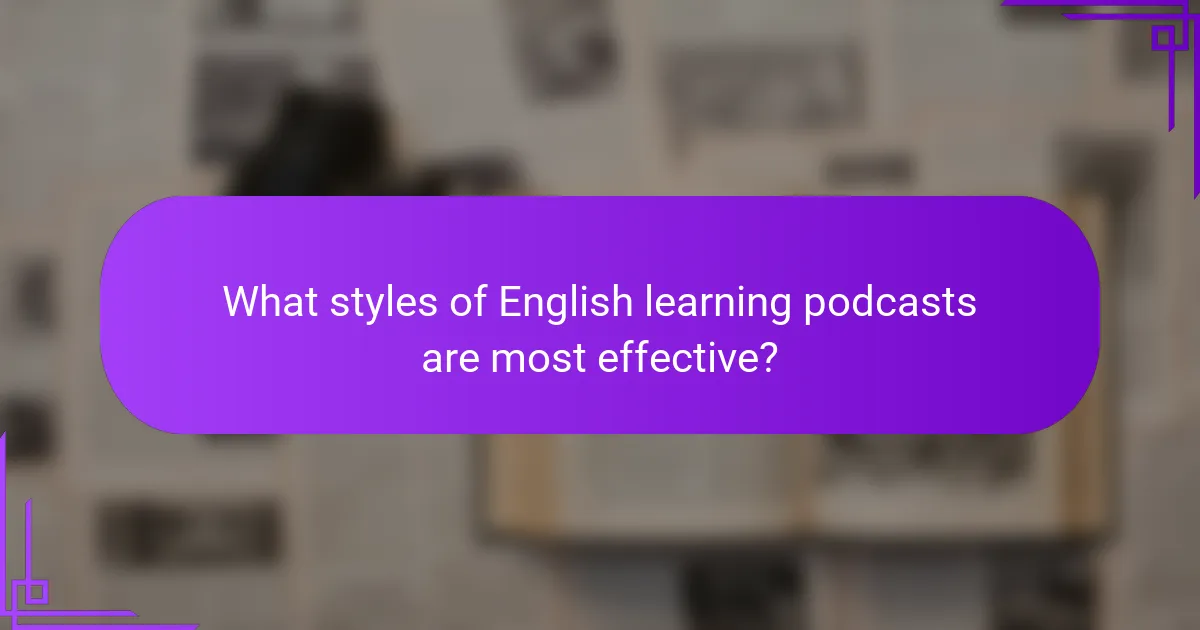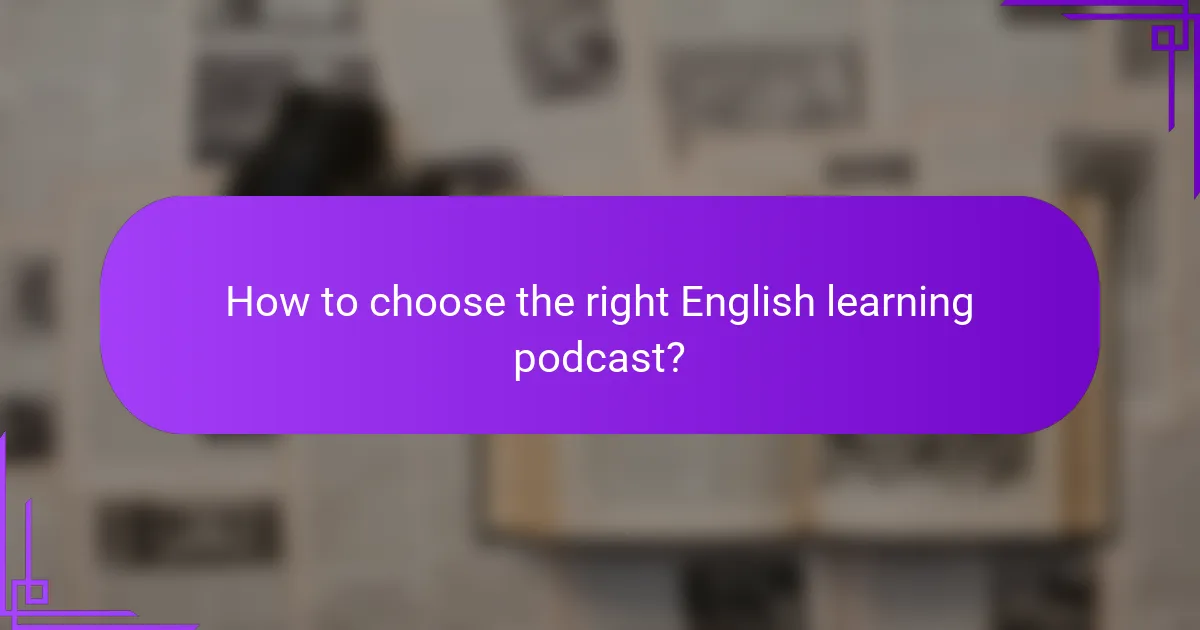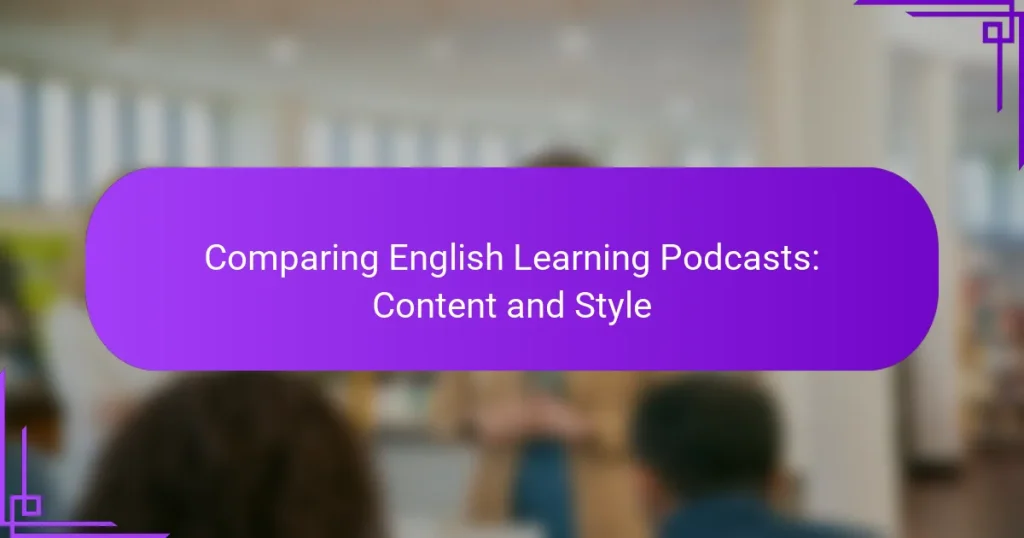When it comes to learning English, podcasts offer a diverse range of content and styles tailored to different skill levels. For beginners, the most effective podcasts provide clear lessons on vocabulary and grammar, while also fostering practical conversation skills. Additionally, the variety in podcast formats—from storytelling to structured lessons—ensures that learners can find an engaging approach that suits their needs.

Which English learning podcasts are the best for beginners?
For beginners, the best English learning podcasts provide clear content, engaging styles, and structured lessons. These podcasts focus on essential vocabulary and grammar while incorporating practical conversation skills.
EnglishClass101
EnglishClass101 offers a comprehensive approach to learning English through audio and video lessons. The podcast features a variety of topics, from basic vocabulary to cultural insights, making it suitable for beginners.
Each episode is structured to build on previous lessons, allowing learners to progress at their own pace. The use of native speakers helps with pronunciation and listening comprehension.
Learn English Podcast
The Learn English Podcast is designed specifically for beginners, providing simple dialogues and explanations. Each episode focuses on everyday situations, making it easy for learners to apply what they hear in real life.
Additionally, the podcast includes transcripts and exercises that reinforce learning, helping beginners to practice listening and speaking skills effectively.
BBC Learning English
BBC Learning English is a well-respected resource that offers a range of podcasts suitable for beginners. The content is produced by experienced educators and covers various topics, including grammar, vocabulary, and pronunciation.
Episodes are typically short, making them easy to digest, and they often include quizzes and interactive elements to engage learners. This format helps reinforce the material covered in each session.
ESL Pod
ESL Pod focuses on slow, clear speech, making it ideal for beginners who may struggle with faster conversations. Each episode features a dialogue followed by detailed explanations of vocabulary and phrases used.
This approach allows learners to understand context and usage, which is crucial for developing conversational skills. The podcast also emphasizes cultural nuances, enhancing the learning experience.
All Ears English
All Ears English targets beginners by focusing on practical English used in everyday conversations. The hosts discuss various topics, including idioms, slang, and cultural references, which are essential for fluency.
Listeners benefit from the relaxed and friendly style of the hosts, making the learning process enjoyable. The podcast encourages interaction through listener questions, fostering a sense of community among learners.

How do English learning podcasts differ in content?
English learning podcasts vary significantly in content, focusing on different aspects of language acquisition. Some emphasize grammar and vocabulary, while others delve into cultural insights or provide conversational practice.
Focus on grammar and vocabulary
Podcasts that focus on grammar and vocabulary typically provide structured lessons that explain rules and usage. They may include exercises to reinforce learning, such as fill-in-the-blank activities or quizzes.
These podcasts often feature clear examples and practical applications, helping learners understand how to use new words and grammatical structures in context. Look for shows that offer a mix of explanations and practice opportunities to enhance retention.
Cultural insights and idioms
Podcasts centered on cultural insights and idioms aim to enrich language learning by connecting it with cultural contexts. They often explore common phrases, slang, and expressions that native speakers use in everyday conversations.
These shows can help learners grasp the nuances of language and improve their understanding of social interactions. Engaging with this content can make learning more relatable and enjoyable, as it often includes stories or anecdotes from different cultures.
Conversational practice
Conversational practice podcasts focus on simulating real-life dialogues, allowing learners to hear and practice speaking in various scenarios. They often feature native speakers discussing everyday topics, which helps learners pick up natural speech patterns and pronunciation.
Look for podcasts that encourage active participation, such as repeating phrases or answering questions, to enhance speaking skills. Regularly engaging with this type of content can significantly boost confidence in conversational abilities.
Listening comprehension exercises
Podcasts with listening comprehension exercises are designed to improve understanding of spoken English through targeted activities. These may include listening to short passages followed by questions or summarizing what was heard.
Such podcasts often vary in difficulty, catering to different proficiency levels. Choose shows that provide clear instructions and feedback to help track progress and identify areas for improvement in listening skills.

What styles of English learning podcasts are most effective?
The most effective styles of English learning podcasts often combine engaging content with practical teaching methods. Popular formats include storytelling, interviews, structured lessons, and casual conversations, each offering unique benefits for learners.
Storytelling format
Storytelling podcasts captivate listeners by weaving language learning into narratives. This format helps learners remember vocabulary and grammar through context and emotional engagement. For example, a podcast might follow a character’s journey, introducing new phrases and idioms as the story unfolds.
When choosing storytelling podcasts, look for those that align with your interests, as personal engagement enhances retention. Aim for episodes that balance entertainment with educational value, ideally featuring a mix of familiar and new vocabulary.
Interview style
Interview-style podcasts feature conversations between hosts and guests, often native speakers, providing authentic language exposure. This format allows learners to hear different accents and speaking styles, which can improve listening skills. Interviews can also introduce cultural insights, making language learning more relevant.
To maximize benefits from interview podcasts, select episodes that focus on topics of interest to you. Pay attention to the pace of speech and try to mimic phrases or expressions used by the speakers to enhance your speaking skills.
Structured lessons
Structured lesson podcasts offer organized content, typically focusing on specific language skills or grammar points. These podcasts often include exercises, quizzes, and clear explanations, making them ideal for systematic learning. For instance, a podcast might dedicate an episode to mastering past tense verbs with practical examples.
When engaging with structured lessons, take notes and practice exercises provided in the episodes. Consistency is key; aim to follow a series regularly to build upon your knowledge progressively.
Casual conversations
Casual conversation podcasts simulate everyday dialogues, helping learners understand natural speech patterns and colloquial expressions. This format is beneficial for improving listening comprehension and conversational skills, as it reflects real-life interactions. For example, a podcast might feature friends discussing their weekend plans, using informal language.
To get the most out of casual conversation podcasts, listen actively and try to participate by repeating phrases or summarizing discussions. Consider using transcripts if available, as they can help clarify any difficult sections and reinforce learning.

How to choose the right English learning podcast?
Selecting the right English learning podcast involves understanding your personal learning goals, the frequency of episodes, the expertise of the host, and the feedback from other listeners. By evaluating these factors, you can find a podcast that aligns with your needs and enhances your language acquisition journey.
Assess learning goals
Begin by identifying your specific learning objectives. Are you looking to improve your conversational skills, expand your vocabulary, or prepare for a language exam? Knowing your goals will help you choose a podcast that focuses on the areas you want to develop.
For instance, if your aim is to enhance speaking skills, look for podcasts that feature dialogues, role-plays, or interactive segments. Conversely, if you want to build academic vocabulary, opt for podcasts that discuss scholarly topics or include guest experts.
Evaluate podcast frequency
The frequency of podcast episodes can significantly impact your learning consistency. Consider whether you prefer daily, weekly, or bi-weekly episodes. Regular updates can keep you engaged and provide a steady stream of new material to practice with.
For example, a podcast that releases episodes twice a week may offer a more structured learning experience compared to one that posts sporadically. Choose a frequency that fits your schedule and allows you to absorb the content effectively.
Consider host expertise
The background and qualifications of the podcast host can influence the quality of the content. Look for hosts who have teaching experience, language certifications, or a strong command of English. Their expertise can enhance the learning experience by providing accurate information and effective teaching methods.
For instance, a podcast hosted by a certified English teacher may offer more structured lessons compared to one led by a casual speaker. Research the host’s credentials to ensure they align with your learning needs.
Check listener reviews
Listener reviews can provide valuable insights into the effectiveness and appeal of a podcast. Look for feedback on platforms like Apple Podcasts or Spotify to gauge how other learners have benefited from the show. Positive reviews often highlight engaging content, clear explanations, and practical tips.
Be cautious of podcasts with consistently negative reviews, as they may indicate issues with the quality of content or teaching style. Aim to find a podcast with a solid reputation among learners to enhance your English learning experience.


